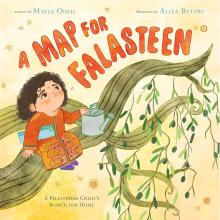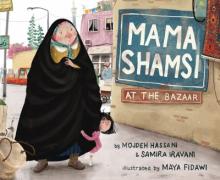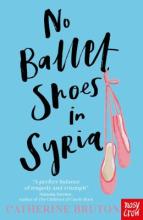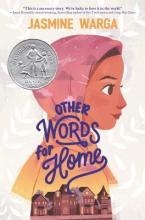The Middle East Book Awards recognize exemplary books for children and young adults that contribute meaningfully to an understanding of the Middle East and its component societies and cultures. Books are judged on the authenticity of the portrayal of a Middle Eastern subject, as well as on their characterization, plot, and appeal for the intended audience. The following selection includes award winners from 2015-2025.

At school, Falasteen and her classmates are tasked with finding their families' home countries on a map, but no matter how hard she looks, Falasteen can't find Palestine.

A mother and a son leave their home for a better day, while a father and a daughter leave their home for a safer day. The father and daughter are fleeing a city devastated by war, leaving their home--and beloved goldfish--behind. All through their journey the goldfish follows them as a symbol of longing and hope. The two families' paths finally cross on a Ferris wheel and, as they go round and round, trading places with each other, we understand that we are all connected.

Upon learning that the books with kids who look like her have been banned by her school district, Kanzi descends into fear and helplessness. But her classmates support her, and together-with their teacher's help-they hatch a plan to hold a bake sale and use the proceeds to buy diverse books to donate to libraries. The event is a big success; the entire school participates, and the local TV station covers it in the evening news.

Loujain watches her beloved baba attach his feather wings and fly each morning, but her own dreams of flying face a big obstacle: only boys, not girls, are allowed to fly in her country. Yet despite the taunts of her classmates, she is determined to do it--especially because Loujain loves colors, and only by flying can she see the color-filled field of sunflowers her baba has told her about. Eventually, he agrees to teach her, and Loujain's impossible dream becomes reality--and soon other girls dare to learn to fly.

Mama Shamsi is off to the market, and today, Samira gets to go with her! As the pair get closer and closer to the market, Samira is worried about getting lost in the crowded streets of Tehran, until she has an idea: She can hide under her grandmother's chador. But when Mama Shamsi says no -- if Samira hides under there, the pair of them will look like a strange animal! But maybe there's some other way for Samira to stay safe with her grandma in the crowded market.

Leilong's friends are taking him to story time at the library. But it's difficult for a large brontosaurus without a library card to follow all the rules. Especially when Leilong gets caught up in the story and joins in. Is Leilong too big for the library, or is the library too small?

Alaa loves Aleppo, but when war comes his neighbors flee to safety, leaving their many pets behind. Alaa decides to stay -- he can make a difference by driving an ambulance, carrying the sick and wounded to safety. One day he hears hungry cats calling out to him on his way home. He feeds and pets them to let them know they are loved. The next day more cats come, and then even more! Alaa has a big heart, but he will need help from others if he wants to keep all of his new friends safe.

All Salma wants is to make her mama smile again. Between English classes, job interviews, and missing Papa back in Syria, Mama always seems busy or sad. A homemade Syrian meal might cheer her up, but Salma doesn't know the recipe, or what to call the vegetables in English, or where to find the right spices! Luckily, the staff and other newcomers at the Welcome Center are happy to lend a hand--and a sprinkle of sumac. Syrian culture is beautifully represented through the meal Salma prepares and Anna Bron's vibrant illustrations, while the diverse cast of characters speaks to the power of cultivating community in challenging circumstances.

Aya is eleven years old and has just arrived in Britain with her mum and baby brother, seeking asylum from war in Syria. When Aya stumbles across a local ballet class, the formidable dance teacher spots her exceptional talent and believes that Aya has the potential to earn a prestigious ballet scholarship. But at the same time, Aya and her family must fight to be allowed to remain in the country, to make a home for themselves, and to find Aya's father -- separated from the rest of the family during the journey from Syria.

Sent with her mother to the safety of a relative's home in Cincinnati when her Syrian hometown is overshadowed by violence, Jude worries for the family members who were left behind as she adjusts to a new life with unexpected surprises.

On a secluded island, hidden in a faraway sea, the animals live in peace and prosperity. But one day, the winds of fate bring humans to their shore A great sadness falls upon the land, and only a young boy named Adam can hear the animals’ cries. Compelled to act, Adam escapes into the jungle and joins with the remaining free animals, attempting to summon the Spirit King, Bersaf. Will the king bring the humans to trial for their harmful actions? Will justice be had? Will balance return to land, sea, and sky?

A collection of 21 riotous tales and riddles about the Mullah Nasruddin. Why does Mulla Nasruddin spoon yoghurt into the river? What is the reason he rides his donkey backwards? Why does he paint a picture that is blank? And is he crazy to move into the house of the man who's just burgled him? Find out all about the amazing antics of Nasruddin in these twenty-one hilarious stories and riddles, famous throughout the Middle East for their jokes, riddles and wisdom.

Ali lives with his great-grandmother in a tiny clay house at the edge of the desert. And one day, he asks if her life's dreams have come true. All except one, she tells him. She had a dream to see the sea, but now she is too old to go. So, the next morning, Ali sets off with a pail in hand. He is going to bring the sea to her.

Provides a candid look at young lives upended by violence and strife around the world, including such nations as Rwanda, Lebanon, and Afghanistan.

When Aref, a third-grader who lives in Muscat, Oman, refuses to pack his suitcase and prepare to move to Michigan, his mother asks for help from his grandfather, his Siddi, who takes Aref around the country, storing up memories he can carry with him to a new home.